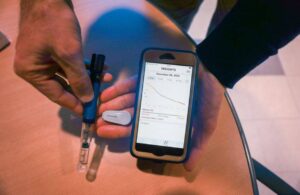
OHSU biomedical engineer Peter Jacobs and OHSU endocrinologist Dr. Leah Wilson lead this project. They plan to organize a randomized clinical trial to evaluate an enhanced app used in concert with diabetes education specialists. The Leona M. and Harry B. Helmsley Charitable Trust awarded the university more than $4.3 million to support the work.
The researchers developed the DailyDose app for people managing type 1 diabetes with multiple daily insulin injections. It uses an AI algorithm to evaluate blood sugar data, identify trends and recommend steps to keep glucose in range. According to a story on OHSU’s website, the app addresses the pitfalls of modern wearable technologies, including continuous glucose monitors (CGMs) and automated insulin delivery systems. That includes the cost of insulin delivery devices in particular. They said that, while diabetes apps exist, “none offer recommendations for modifying insulin doses or behaviors like DailyDose.”
A study published in November 2022 found that blood sugar levels “significantly improved” when users followed recommendations from the app. Those who followed the app’s recommendations less failed to receive the same benefits, the researchers say.
“Our recent study found that some people didn’t accept the recommended changes provided by the app because they didn’t understand how the recommendations would improve their glucose management, or because they mistakenly thought that making the recommended changes would negatively impact their health,” said Jacobs. “We also found that other barriers prevented some people from making changes to their glucose management. For example, if you’re under a lot of stress or if you work multiple jobs, managing your glucose and taking the time to do something new can seem overwhelming or even impossible.”
More on the OHSU app and coming clinical trial
The OHSU website described a two-pronged approach to the application. It uses new glucose forecasting algorithms and an improved user interface. It also connects those who can’t improve their glucose levels using the app alone to a diabetes educator or a behavioral health clinician.
Researchers say the clinical trial first will have its participants use the DailyDose app and only receive coaching if necessary. They say one-on-one education can bring high costs and consume time. The researchers designed the app for affordability and scalability.
The trial follows 93 people with type 1 diabetes for 38 weeks. After the first 12 weeks, participants who don’t benefit from using the app alone will also be connected with a diabetes educator or psychologist. The study, set to begin in 2024, spans six institutions. It includes the Harold Schnitzer Diabetes Health Center at OHSU, Joslin Diabetes Center at Harvard University, University of Southern California, University of California San Diego, Mount Sinai Hospital and Barbara Davis Center for Diabetes at the University of Colorado.
“Some people struggling with glucose management may benefit from personalized coaching,” said Wilson. “But, knowing that coaching is resource-intensive, our study will only offer it to those who need it. We call this combined approach app-based certified diabetes education therapy, or AB-CDE.”

